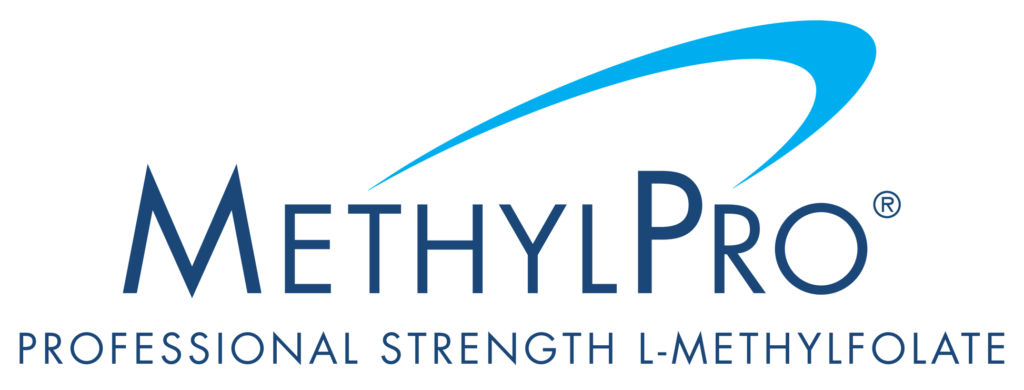Genetics and epigenetics are the scientific explanations for “nature vs. nurture”. Your genetic code (nature) has some control over your potential physiology. However, the way you care for your body and the experiences you have (nurture) will all affect when and whether you reach your genetic potential. These are epigenetic factors. Below is a deeper explanation, focused around genetics vs epigenetics affecting the MTHFR gene, L-methylfolate production, and methylation.
Genetics
Upon conception, a baby inherits two copies of every gene; one from each parent. MTHFR is the name of one particular gene, out of thousands, that each person has 2 copies of. The gene codes for an enzyme called “methylenetetrahydrofolate reductase (MTHFR)”. MTHFR is responsible for the conversion of dietary folate (vitamin B-9 or folic acid) into its biologically active form, L-methylfolate, which your cells use in the process of methylation. Methylation is happening in almost every cell of your body at a rate of billions of times per second. It contributes to a multitude of different biological processes.
Unfortunately, many people have a slight change to the code in either one or both copies of their MTHFR gene. A difference in a code for a certain gene is a “mutation”, “variant”, or “polymorphism” depending on the context. If the MTHFR gene is coded incorrectly, the MTHFR enzyme cannot be produced efficiently or correctly. Thus, folate will not be activated at a normal rate and the downstream effect can be detrimental to methylation, and therefore, your health.
When a person has inherited one copy of a dysfunctional gene, and one normal copy, they have a 50% chance of passing on the mutation to each of their children. If a person has 2 dysfunctional genes, each of their children will inherit at least one dysfunctional gene. That is how humans pass the MTHFR variants genetically. It is the genetic reason that you may be under-producing MTHFR and experiencing a deficiency in L-methylfolate and reduced methylation.
What to do?
If you are experiencing symptoms that indicate a possible L-methylfolate insufficiency, it may be advisable to have your blood tested for L-methylfolate, and your genotype tested for MTHFR polymorphisms. Your trusted healthcare professional can administer a genetic test. Or you can buy an at-home testing kit such as 23andMe.
Epigenetics
It is possible that you have two perfect copies of the MTHFR gene, but are still under-producing MTHFR enzyme and experiencing a deficiency in L-methylfolate and inefficient methylation. It could be the result of “epigenetics” which directly translates to “above the genome”.
Epigenetics is the study of environmental factors that do not alter the genetic code directly, but modify gene expression. This changes the abundance of resulting proteins, and thereby affecting the health and/or structure of the organism to whom the genetic code belongs.
Epigenetic factors that negatively affect methylation can include a poor diet or a lack of cofactors such as vitamin B-12, environmental toxins like pollutants or pesticides, the amount of activity or rest your body gets, or a disease state, among others. Epigenetic factors act like on/off switches for certain genes, controlling when and how much of a certain protein to build. Epigenetics is the reason identical twins can look different or have different levels of health, even with the same genetic code.
Medications
In terms of specific factors that can alter the effectiveness of MTHFR, there are some drugs that are known to block intermediaries in the folate cycle [1]. These drugs are considered “antifolates.” Prescribing physicians may not always consider the holistic, cellular effects they may be having throughout the body, such as slowing methylation through antagonization of the folate process [1].
Diet
How much dairy are you consuming? It has been demonstrated that high levels of dietary milk intake are associated with high levels of folate-blocking antibodies [2]. These antibodies, which can prevent the absorption of folate, have been shown to cause similar downstream effects as those seen in patients with severe folate deficiency or an MTHFR mutation [3].
But just to make things more complicated, how much dairy are you consuming? It turns out, there’s a balance. Methionine, an amino acid with a critical role in methylation and the folate cycle, has to come from your diet. You can find it in foods like dairy products, meat, and fish. Low methionine in the diet can alter the efficiency of methylation, even when MTHFR is plentiful. Those on plant based/dairy-free diets are at a higher risk for methionine insufficiency.
What Can I Control?
You can’t change your genes, but you are (most likely) in total control of your folate status. If you have genetic testing done and find out you carry one or two polymorphisms of the MTHFR gene, you can begin supplementing with L-methylfolate. This is the easiest way to make sure your body is getting all of the activated form of vitamin B-9 that it needs for the folate pathway and methylation, without depending on the MTHFR enzyme as the middleman.
Even if you do not have an MTHFR mutation, you can supplement with methylfolate instead of folic acid. Any epigenetic factors that may be altering MTHFR efficiency would no longer be in control of L-methylfolate availability.
Whether or not you have an MTHFR mutation, take a look at your lifestyle and your diet. Make sure your body is getting all the precursors and cofactors necessary for the essential cellular processes to work at maximum efficiency. If you are on medications that affect folate status, talk to your doctor about combating this issue nutritionally. Discuss possible alternatives that will benefit your health across the board. You dont have to sacrifice one element of your health to improve another.
References
- https://cir.nii.ac.jp/crid/1362825894722589696
- https://pubmed.ncbi.nlm.nih.gov/19282368/
- https://www.sciencedirect.com/science/article/abs/pii/S0165037808000752

